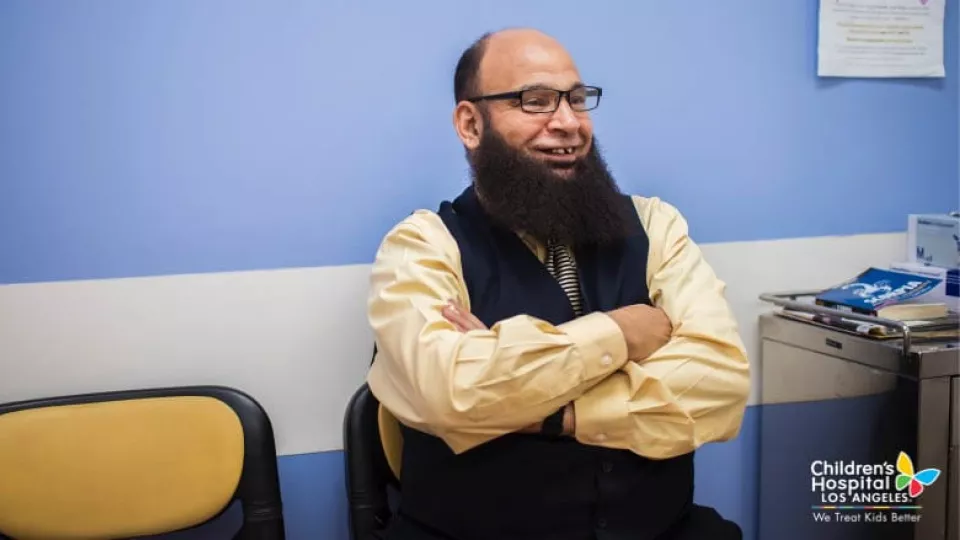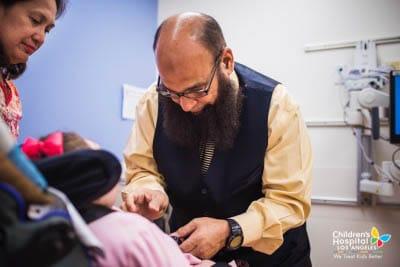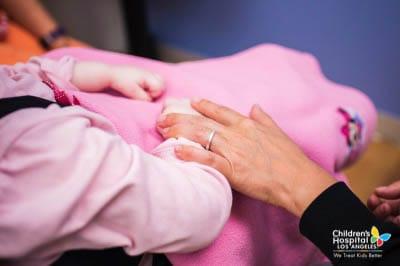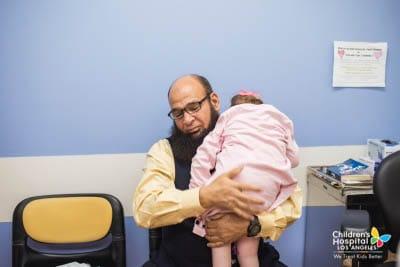
The Father of Last Resort
Some of these children come to him without names, so this most faithful Muslim does what the old Hebrew texts would praise: He crowns them.
“In the hospital, they give birth, they leave them,” Mohamed Bzeek says in the clipped accent of his native Libya, the words issued in vehement bursts. “Their families don’t name them. It comes on the paper: ‘Baby boy,’ ‘Baby girl.’ I name them. I give them names.”
In the more than 20 years that Bzeek has been fostering sick and terminally ill kids, 10 have died, but none without a name.
A name isn’t shelter, so he has given them that, too—this orderly four-bedroom house in an unassuming neighborhood in Azusa. He has made sure to give them a home.
Bzeek would say he hasn’t given them anything at all, but has merely met the terms proposed by his faith. “It is obligatory,” he says. “If I can help somebody, I have to help.
“I believe each kid has the right to have a family, and someone who loves them and cares about them and can be with them during their difficult time.”
Most of the children he fosters are abandoned soon after birth, once their parents learn of the terminal diagnosis, or discover it’s too much for them to take on. Los Angeles County’s Department of Children and Family Services turns to Bzeek; no other foster parent will take them. “Nobody wants to take them because nobody wants to deal with death,” he says.

Bzeek was initiated into foster parenting in 1989 when he met and married his late wife, Dawn, who had been providing foster care since the early ’80s. He had come to the U.S. about a decade earlier as a student and had been pursuing a career as an electrical engineer. In 1995, he and Dawn began fostering sick and dying children exclusively, wanting to give them the family surroundings not afforded at a facility or institution. They would care for as many as three terminally ill kids at one time.
“I used to have four women in the house!” Bzeek says, grinning. “My wife and three nurses! Heh heh heh!”
Dawn passed away from lung disease two years ago. Without her, Bzeek only has the capacity to handle one child. Now in his care is a 6 ½-year-old girl who suffers from microcephaly, a neurological disorder that stunts the development of the brain and skull. She is blind and deaf and unable to move her arms and legs. She sits upright supported by cushions, at the end of the sofa opposite Bzeek.
Bzeek took her in when she was 6 weeks old and was told she would only live for months, at most. Yet here she is. “It’s just prediction,” Bzeek says. “Nobody knows. God knows, really. Every day I wake up and she’s alive, it’s a blessing.”
He pops up regularly to quell her sudden fits of gagging, using a tube to suction out the saliva she generates but can’t swallow. “What’s going on? What is this?” he says to her sweetly. He pets her cheek and tousles her hair, and tweaks her chin. “Why are you doing that? Why are you scaring Daddy?”
Bzeek is on his own today; the weekday nurse who frees him to run errands is away. He says his last day off was in 2010, when he visited Libya for only the second time since leaving the country in 1978. Any excursion out requires a lengthy effort to pack up machines and medications. If he does leave the house, it’s likely for an appointment at Children’s Hospital Los Angeles, where he takes each of his foster kids for treatment.
He doesn’t expend long thoughts on why he does this. Why does anyone do anything? Because it needs doing. “These kids need somebody,” he says. “These kids need help. They have nobody.”
Bzeek also cares for the one son he had with Dawn, Adam. The 19-year-old was born with dwarfism and osteogenesis imperfecta, which translates to brittle bone disease. He has broken every bone in his body. Bzeek says he can fracture his elbow just by leaning on it.
Adam can’t walk, so Bzeek modified the house to accommodate him, swapping out the carpet for wood floors. He used to move about by rolling on his stomach; now he surfs from room to room resting on a skateboard that his father fashioned out of an ironing board and a pair of roller-skate wheels.

Bzeek says he was always frank with Adam about the nature of the children he would bring home, the ones Adam would come to regard as his siblings. “These are the kinds of kids we take and they’re going to die,” Bzeek told him. “We don’t know when, but we take them and help them so they can have family, have security, have something they call home.”
The first foster child to die in Bzeek’s care was a year old. She had spina bifida, resulting in part of her spine growing outside her skin. She was in a full body cast when she passed away on July 4, 1991, as Bzeek was taking a shower while his wife made dinner.
He recalls hearing a lot of commotion, racing from the shower and finding paramedics in his house. Dawn told him the girl had died. He relives it: “What do you mean she died? She was OK!” He throws his hands back, mimicking his wife’s stoic response. “‘She died.’ I was so sad, I cried for three days. Unbelievable.”
He recounts a few others, including one boy who lived with Bzeek for eight years. He had short-gut syndrome and took his meals through a feeding tube, but Bzeek and his wife set a place for him at dinner each night. “We gave him his plate, his spoon, his fork, his cup—but there was nothing in it,” he says.
Ask him why go to all that trouble, and his voice rises, incredulous. “He’s family! We sit as a family!” He softens his tone. “All of us at the table.”
He hadn’t told anyone of his foster parenting until last February, when a Los Angeles Times story brought Bzeek out of anonymity and into a rush of worldwide media attention. He did interviews with CNN, Al Jazeera, Telemundo, and British and Turkish TV. Within three days of the story’s publication, a documentary crew was in his house, shooting, and later followed him through a visit to CHLA. One online commenter called Bzeek the Muslim Mother Teresa. A woman in Oakland opened a GoFundMe account on his behalf; he didn’t learn of it until the company contacted him. The donations will be a boost to the $1,600 a month he gets from L.A. County. He plans to put the money toward some essential home improvement, starting with installing air conditioning.
A second-grade schoolteacher went so far as to make a video storybook about Bzeek’s beard, a furry nest that precedes him by a good three inches. The video recites in illustration the many things his beard is, starting with, “His beard is full of love.”
He hasn’t trimmed it in four years, but there was a time it was cropped into a tight goatee. And he was thin once, too, 75 pounds lighter than he is now. The collection of running shoes lining a bottom shelf inside his front door carried Bzeek through 16 marathons, the last in 2006. He stopped running as his wife’s health began to decline.
At 62, he has had his own health struggles. He had a heart attack in 2012, and he’s diabetic. Last December doctors removed 15 centimeters of his colon after discovering stage-2 cancer. “I had no family and I was scared,” he says. “I felt the same what the kids feel. They are alone. If I am 62 and I am scared, what about them?”
He is accepting of death and dying, as he would have to be to permit so much of it into his home. “We know there are three things written on you before you’re born,” he says, “when you’re going to die, how you’re going to die and where you’re going to die.

“These things are out of my hands. I do whatever I can for these kids, fight for them, do anything they need, and then I leave the rest to God, the god who created them.”
In his front yard, he stands under a tree that offers a large circle of shade. He’s not so impressed by it. “We used to have a big one,” he says, tilting back with outstretched arms. “It was a bi-i-i-ig one.”
The grass is patchy and listless. He says he’ll use part of the GoFundMe contributions to restore it. You can’t help but notice there’s a giant A embedded in the mountainside north of the house. It would be foolish and corny to think it stands for the angel down the hill. It might not be wrong, though.


